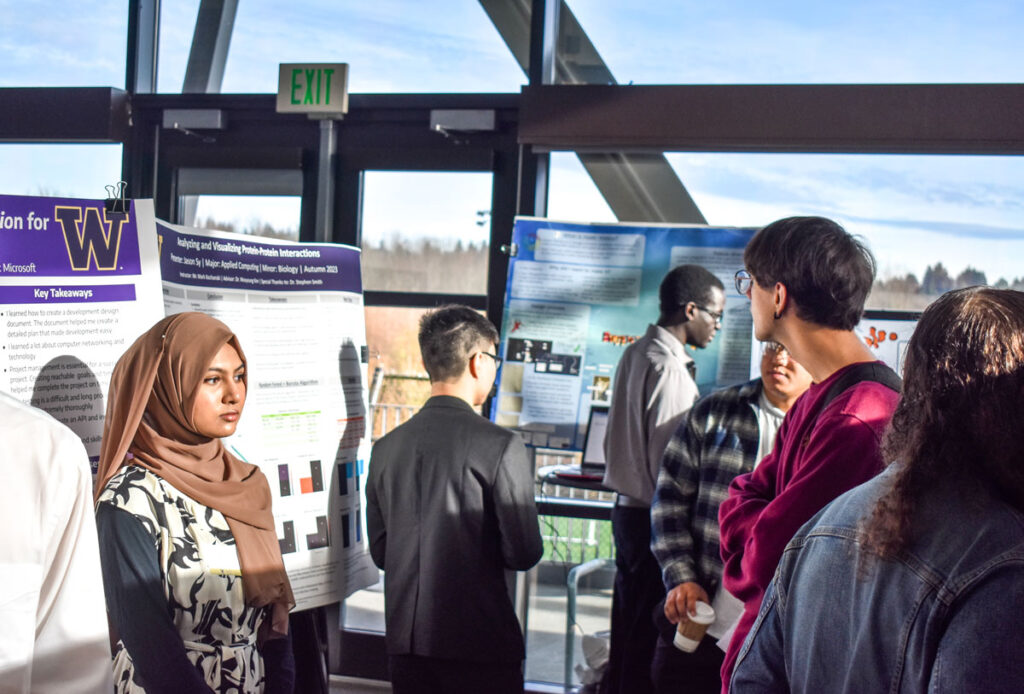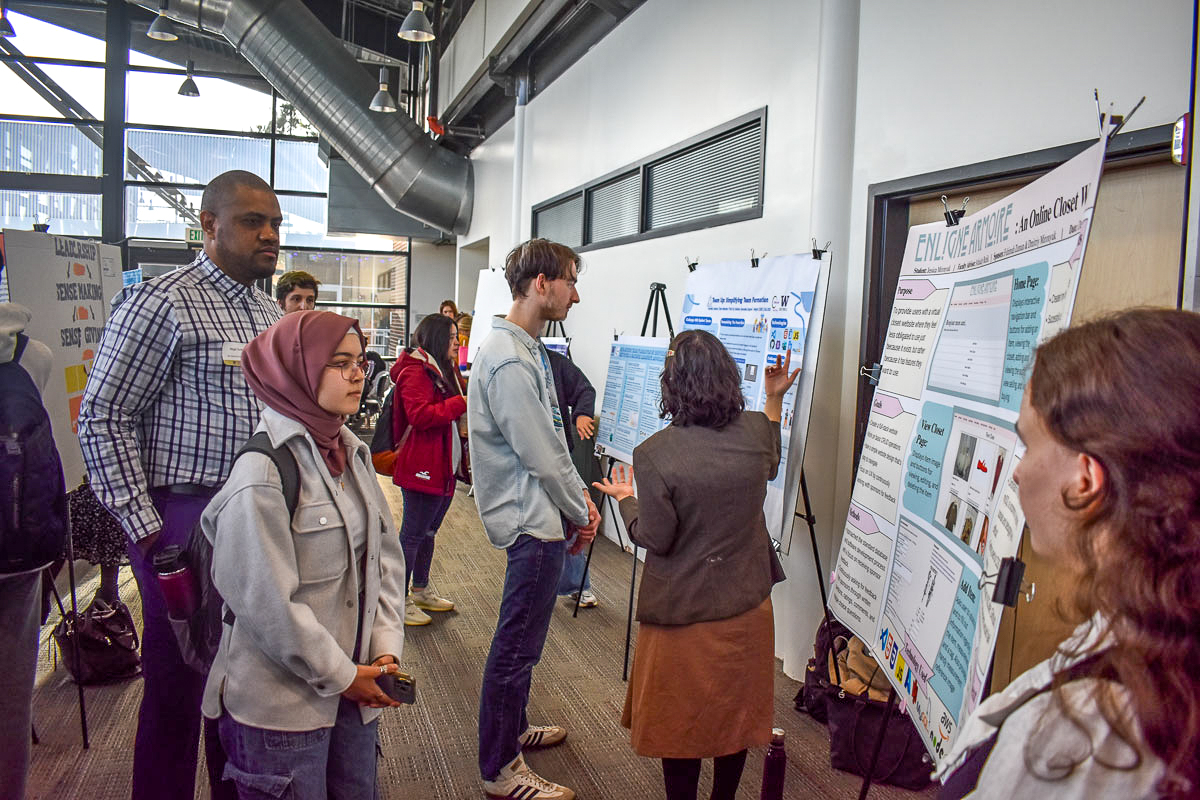At the University of Washington Bothell, hands-on learning opportunities are integral to the student experience. Students can expect to learn new concepts and ways of thinking in the classroom — and they get the chance to put what they learn to practice through research, internships, field work and other projects.
For UW Bothell’s School of STEM, this is showcased each quarter in an Undergraduate Capstone & Symposium event where students studying biological and physical sciences, engineering, mathematics, and computing and software systems share their capstone research and projects through oral and poster presentations.
The breadth of work exhibited in the autumn 2023 presentations on Dec. 15 ranged from research on “Coral Reef Susceptibility to Disease” and “Examining Optimal Urban Habitats for the American Crow” to internships and app-development projects with industry partners such as Amazon and REI.
STEM students graduate with a resume, not just a diploma, because of the opportunity to partner with faculty research and industry projects. When students work with faculty to solve real-world problems and support our partners, they unlock their potential and have real impact as they learn and stretch.
Dr. Leslie Cornick, dean of the School of STEM
Digital upgrade for antique mall
When her grandfather asked for help developing a new point-of-sale system for an antique mall, Maggie Summers saw the perfect opportunity for a capstone project. A Computer Science & Software Engineering major, Summers was excited to put her skills to work and collaborate with her grandfather.
Dennis Summers, a programmer, had designed the initial software system for the Olde Central Antique Mall in Port Orchard, Washington, in the 1980s. The application required users to enter information by hand — such as the name, price, payment type and date for every item sold. With a high volume of sales with more than 100 vendors, the old system became a cumbersome process for the mall in an increasingly digitized world.
“This had proved time-consuming and could not reasonably be done at the time of sale,” Maggie Summers said. “One can only imagine the number of hours wasted and typographical errors made when entering so many sales in the evening, especially on a really busy day.”
In the new user interface, Summers and her grandfather created an application that used QR codes containing all the item and vendor information needed to process sales as they happen, rather than at the end of the day.
Summers said that while she didn’t grow up coding and initially found the idea intimidating, seeing her grandfather work as a programmer opened her up to the idea. “It just seemed fun and like a way that I could express my creativity while also being technical.”
She’s still searching for her niche as a software engineer, but Summers said she enjoyed the experience of working with and learning from her grandfather. He also told her that he learned from the ideas and new methods she brought to the project.
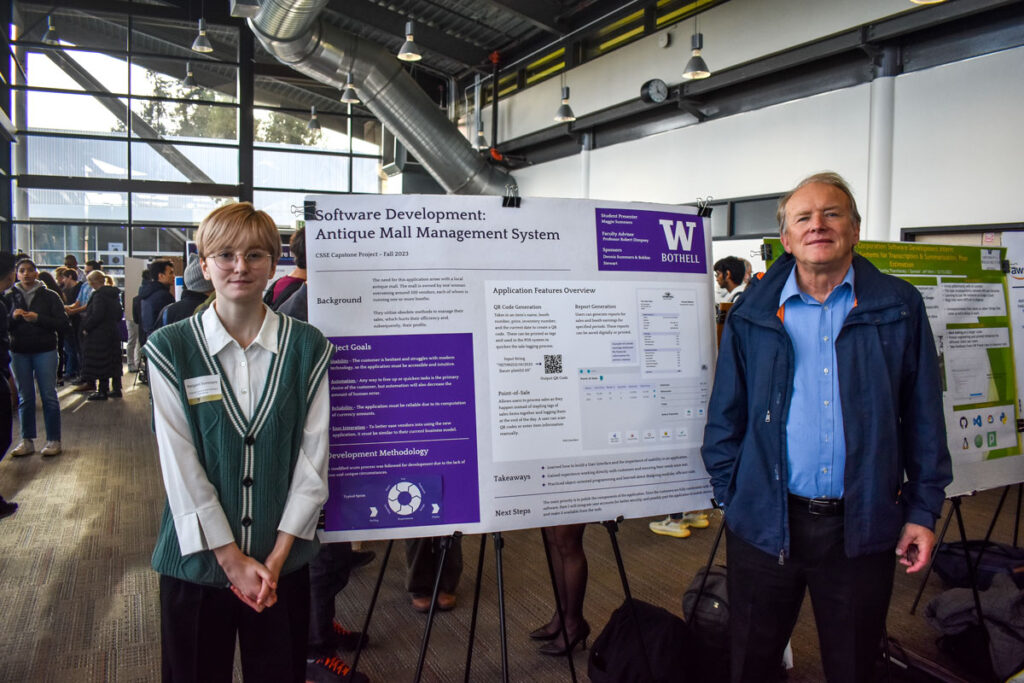
Tool for individuals with autism
In search of a research project, CSSE major Elizabeth Castillo reached out to her faculty adviser, Dr. Annuska Zolyomi, assistant professor in the School of STEM. Recently, Zolyomi had worked on The Luna Project, which promotes education during pregnancy, specifically among Indigenous women in Panama, where Zolyomi has family ties.
Wanting to do a similar project that would benefit families with children with autism, Castillo and Zolyomi embarked on a new study to explore the effectiveness of digital “social stories” in aiding individuals who have autism with understanding social interactions, emotions and activities. A learning tool, social stories are visual and audio narratives that help prepare neurodivergent individuals for various life events and for changes in their daily routines.
Because Panama is also Castillo’s home country, the researchers decided to focus on that region again. The scope of their work also aimed to provide a cultural context and to address how education gaps, particularly in rural areas, had left many families without valuable information and resources to support their children with autism.
The project was two-fold, interviewing parents online and designing an application prototype in Spanish. While Castillo enjoyed the opportunity to apply her computer skills to the project, she said that interviewing the families proved to be the most rewarding part of the research and equipped her with an unexpected skillset.
“Learning how to ask questions and knowing when to interrupt in a respectful way was tricky, but I definitely learned a lot,” she said, adding that going into computer science she hadn’t anticipated interacting much with people. “It’s a totally new skill that I acquired. I’m very introverted, and I would sometimes stutter. I was so nervous, but it got easier with each interview.”
During the interviews, Castillo was excited to hear positive responses from the families about how they believed the social stories tool could help them. Castillo and Zolyomi plan to write a paper on their work to present at a conference in Costa Rica later this year. Zolyomi will also continue the project with other students, with the hope of someday creating a fully functional app available in Panama and other countries around the world.
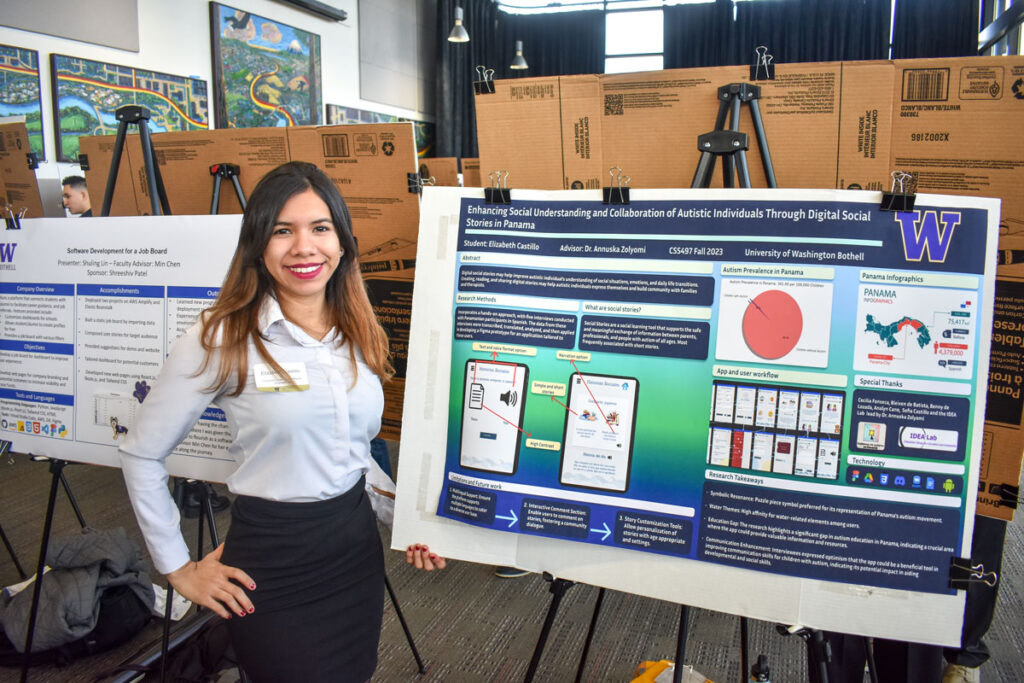
Tech solution to language barriers
For his capstone project, “Polyglot Go – Bridging Language Barriers Through Innovation,” Nguyen Vi Cao worked on a two-person team to create a language-learning app.
Majoring in CSSE and minoring in Economics, Cao was inspired by existing language apps such as Duolingo and Babbel and by the level of coding and database management such apps require. He noted that as both he and his project partner, Andrew Chou (CSSE, ’23), are international students, they know language learning is important — and the main objective of their project was to make language learning easy and enjoyable.
“In a world increasingly defined by linguistic diversity, language barrier has become a main issue for everyone, especially for the newly transferred or admitted students,” Cao said in his presentation. “Due to this, learning new languages and cultures, and making new friends have emerged as a real challenge.
“However, this should not present an obstacle to prevent one’s passion. We believe learning new language and cultures should be fun and simple.”
Cao and Chou developed the app, called “Polyglot Go,” to be available on desktop, iPad and iPhone. It features multiple ways to learn, including flashcards, word matching and translation that are available in Mandarin Chinese, Vietnamese and Khmer. They also created a tracker for users to monitor their progress.
While the pair have no plans to make the app publicly available, Cao said the project was a fun way to use their knowledge and learn how to collaborate as a team building something from scratch. These are both critical skills, he said, that he will take with him as he pursues a career in software engineering.
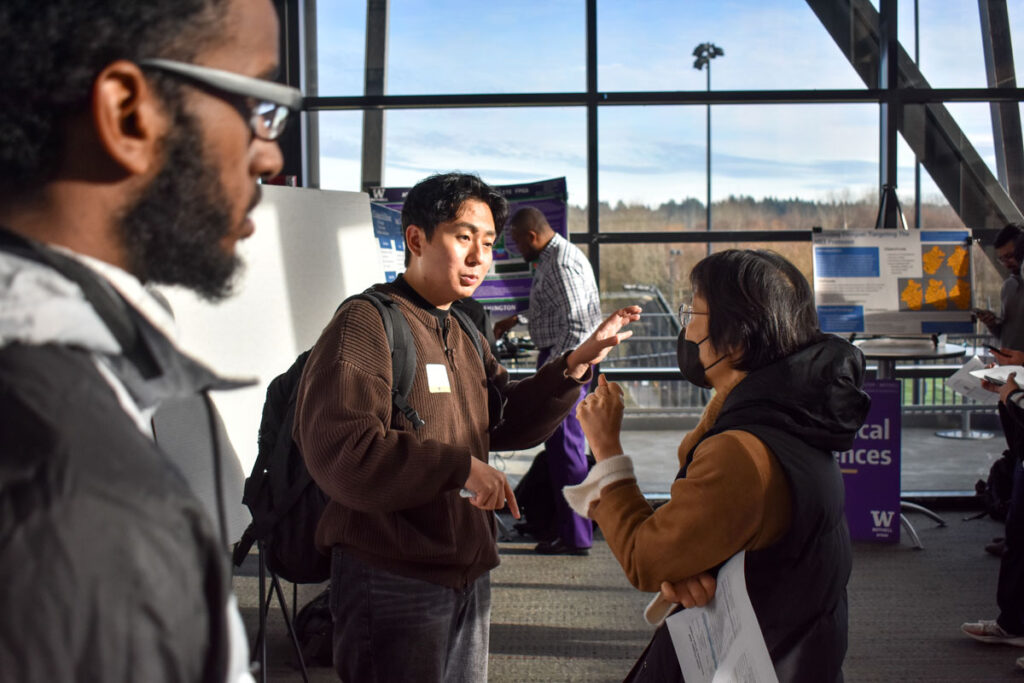
A culmination of hard work
For many students, including Summers, Castillo and Cao, the Undergraduate Capstone & Symposium marks the end of their undergraduate education, after which they move on to continue their education or enter the workforce.
Many of the projects involve collaboration with industry partners and research mentors, often leading to future research and career opportunities, noted Dr. Leslie Cornick, dean of the School of STEM.
“STEM students graduate with a resume — not just a diploma — because of the opportunity to partner with faculty research and industry projects,” she said. “When students work with faculty to solve real-world problems and support our partners, they unlock their potential and have real impact as they learn and stretch.”
A complete list of the autumn 2023 Undergraduate Capstone & Symposium presentations can be found here. These quarterly presentations are open to the public and can be found on the UW Bothell events calendar.
